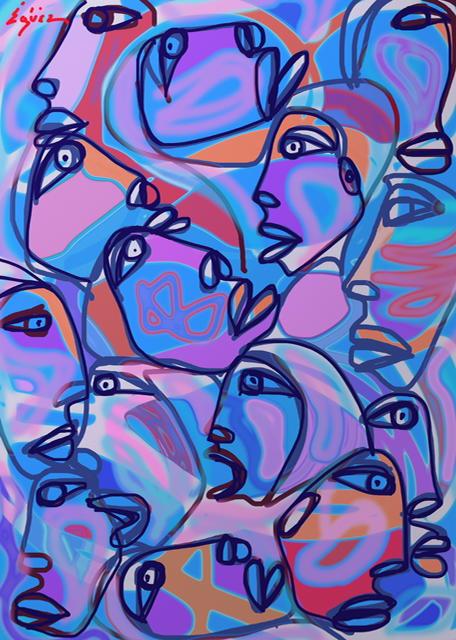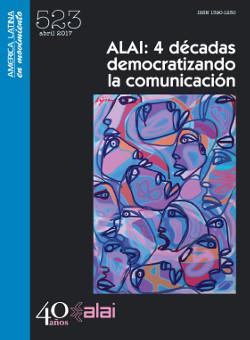ALAI: a forty-year trail
ALAI evolved as an information mechanism based on a network of relations with popular and alternative media, social organizations and support entities, correspondents and collaborators, documentary and investigation centres...
- Opinión

| Article published in ALAI’s magazine No. 523: ALAI: 4 décadas democratizando la comunicación 27/04/2017 |
We are celebrating a special anniversary: last March we completed 40 years of uninterrupted activity, with a long track record in information and in commitment to the democratization of communication, as a mainstay for a democracy worthy of that name with effective participation of the different historically excluded social actors.
The point of departure for this journey was Montreal, Canada, where several Latin American journalists decided to take on the challenge posed by the lack of information and the misinformation existing on Latin America, both in the exterior and within the region. Thus the Agencia Latinoamericana de Información (ALAI) (Latin American Information Agency) was created. This challenge meant responding to the information void resulting from monopolistic control over the circulation of information coming from and going to Latin America.
A few months after it was launched, through an assessment of our information practice during that initial period, we concluded that it was not only a question of contributing to fill the information void, but also of strengthening structural communicational responses, which meant weaving a new decentralized, broad-based and democratic communications network. And thus, little by little, the idea of establishing an information agency along traditional lines gave way to the logic of convergence and working agreements with entities akin to ours.
This option undoubtedly somewhat affected the capacity for news reporting, but on the other hand, it made way for consolidating a line of analytic information centred on social processes and organizational dynamics from a people’s perspective. And, moreover, interconnected with these dynamics.
With this perspective, ALAI evolved above all as an information mechanism based on a network of relations bringing together popular and alternative media, social organizations and support entities, correspondents and collaborators, documentary and investigation centres, etc. from different Latin American countries. Ultimately, it is thanks to this particular confluence of actors articulated in a networking dynamic that we have arrived at our 40th year.
Convergence
Thus, ALAI became part of various initiatives of alternative and popular communication that began to flourish in Latin America and the Caribbean, committed to contributing to the social transformation of the region and encouraging the active participation of social organizations in political decision-making; but we also realized that this potential was limited by being dispersed.
We therefore promoted the First Meeting of the Peoples Press that took place in Montreal from October 30 to November 4, 1978, where it was agreed to establish an "Information Coordination" among popular communications groups from Latin America and the Caribbean, as a result of which seven other exchange and training meetings would take place over a decade, giving rise both to joint action, and a more precise characterization of popular communication. Moreover, and very importantly, it provided a basis for a direct relationship with local social organizations themselves.
After ALAI moved its head office to Ecuador in the 1890s, this interaction with social organizations registered an important landmark with the Andean Workshop of Exchange of Experiences in Education and Communication among Peasant and Indigenous Organizations, (Quito, October 7 to 11 1987), organized by the Ecuadorian organizations Ecuarunari and FENOC, together with ALAI. The participant organizations agreed to continue the interchanges; and it is within this framework that the 500 Years Campaign of Indigenous, Black and Popular Resistance was forged, which was to become the cradle from which the main social coordinating bodies in force today emerged, such as the Latin American Coordination of Rural Organizations – CLOC/Via Campesina.
In this process, ALAI incorporated a line of work destined to sharing its accumulated experience through training and counselling in communication for members of social organizations and popular media, through workshops, internships, etc. Thus, for example, ALAI took on the pedagogical coordination of the First Workshop of Communication and Information organized by CLOC (Quito, 17-25 February 1997), so that their affiliate organizations could develop communication policies and strategies, both internally and for the public dissemination of their viewpoints. Subsequently, this dynamic led to the creation of the "Minga Informativa de Movimientos Sociales" (social movements information pool - www.movimientos.org.) with the participation of other social coordinating bodies.
In previous years, Quito was the scenario of another key encounter in the quest for the democratization of communication. The Latin American Meeting of Alternative and Popular Media (April 19-23 1993) convened by ALAI, ALER and Cerigua (of Guatemala), where it was agreed to seek a higher level of coordination among the participating media; moreover, a proposal was formulated on the “Right to Communicate" that was presented to the World Conference on Human Rights (Vienna, 14-25 June 1993).
Five years later, the World Forum "Vienna + 5" took place in Ottawa (22-24 June), where a petition was formulated to the UN to call a "World Conference on Communication", that emerged from the consultation in Latin America and the Caribbean previous to that forum, which was facilitated by ALAI on the request of Human Rights Internet, coordinating body of Vienna+5.
A few days later, this petition received the support of the International Forum on Communication and Citizenship (San Salvador, 9-11 September 1998), organized by ALAI and related entities. The particularity of this event was that it became a space for convergence among social movements and popular communication entities around the right to communicate.
In 2000-2001, due to its track record in human rights and relationship with social movements, the UN High Commission on Human Rights gave ALAI the responsibility of organizing the Forum of the Americas on Diversity and Pluralism (Quito, March 2001), preparatory to the World Conference against Racism, Racial Discrimination, Xenophobia and related forms of Intolerance (WCAR, Durban 2001). This Forum was conceived as a process of building consensus, destined to facilitate proactive participation of civil society of the continent in the WCAR.
In this same path of convergence, towards the end of the first decade of the present century, under the impulse of the new regional integration initiatives, a space was created for interchange on communication and integration that led to creating the "Forum on Communication for the Integration of Our America”, that today brings together more than 30 media networks and outlets as well as social coordinating bodies of the continent, with the common goal of promoting people’s integration and the democratization of communication.
The technological dispute
Another aspect of the democratization of communication that ALAI has assumed is that of new technologies and the Internet. Noting, towards 1988, that Ecuador was lagging behind in data transmission, ALAI led an initiative that gave birth, in 1991, to the first electronic mail node in the country: Ecuanex. We therefore proceeded to register the .ec (Ecuador) domain and to set up an association to administer the node – Intercom –, initially composed of 21 non-governmental entities and universities.
On the basis of this experience, in the ensuing years ALAI dedicated efforts to promoting the importance of these technologies for international social networking. This led to taking on the coordination (1993-95) of the global "Women’s Networking Support Program" that the Association for Progressive Communications – APC – (a network dedicated to electronic communication) organized around the UN World Conference on Women (Beijing 1995). Thanks to this preparatory process, in collaboration with the UN, a precedent was established for world conferences in facilitating civil society exchange forums on electronic networks.
ALAI’s Women’s Program, together with APC and other organizations, also engaged in promoting proposals with respect to communication and technologies as an opportunity for women’s empowerment, many of which were incorporated into Section J: “Women and the media" of the UN Beijing Platform for Action.
Similarly, ALAI was actively involved in the UN World Summit on the Information Society (WSIS) (Geneva 2003/Tunis 2005). As part of the "Campaign for Communication Rights in the Information Society” (CRIS), in 2002-2003, we took on the co-coordination of the global civil society "Working Group on Contents and Themes", in which consensus was built around proposals to channel towards the Geneva Summit, and which were compiled in the "Civil Society Declaration".
And more recently, since one of the great challenges of the present times has to do with the dispute around digital technology, ALAI has joined the global initiative to organize an Internet Social Forum, with the aim of reclaiming and rebuilding a people’s internet, in the framework of which ALAI is co-organizing a preparatory regional meeting in Quito this year.
All along this 40-year trail, the line of work in information (information/ capacity building) has been maintained with regularity, with contributions that encourage critique and reflection on crucial issues that our continent and our world are facing.
The April edition (523) of ALAI’s Spanish language magazine América Latina en Movimiento, entitled "ALAI: 4 décadas democratizando la comunicación” (ALAI: 4 decades democratizing communication) recalls some of the milestones of this 40-year trail, including articles and statements published during this period.
27/04/2017
(Translated for ALAI by Jordan Bishop)
(This is the introductory article to the magazine América Latina en Movimiento No. 523: ALAI: 4 décadas democratizando la comunicación)
Del mismo autor
- Los 100 de don Pablo 13/02/2022
- A social pact for education 17/03/2021
- Un pacto social por la educación 05/02/2021
- Forum social mondial virtuel 2021 19/01/2021
- Foro Social Mundial Virtual 2021 19/01/2021
- Virtual World Social Forum 2021 19/01/2021
- Julian Assange e o julgamento da liberdade de imprensa 12/01/2021
- Julian Assange and the trial against press freedom 05/01/2021
- Julian Assange y el juicio a la libertad de prensa 04/01/2021
- Ola Bini case: Judge denies annulment of trial 16/12/2020
Clasificado en
Comunicación
- Jorge Majfud 29/03/2022
- Sergio Ferrari 21/03/2022
- Sergio Ferrari 21/03/2022
- Vijay Prashad 03/03/2022
- Anish R M 02/02/2022









